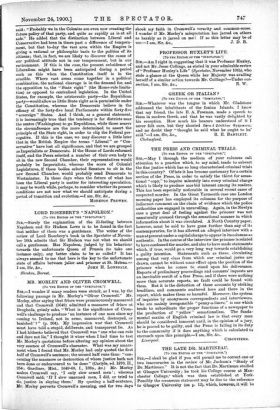MR. MORLEY AND OLIVER CROMWELL.
[TO THE EDITOR OP THE "SPECTATOR."]
SIR,—I wonder if many readers were struck, as I was, by the following passage in Mr. Morley's "Oliver Cromwell." Mr. Morley, after saying that friars were promiscuously massacred and that Cromwell (1649) admitted a massacre of friars at Drogheda, grimly asks, "What is the significance of Crom- well's challenge to produce an instance of one man since my coming to Ireland, not in arms, massacred, destroyed, or banished' P" (p. 304). My impression was' that Cromwell must have told a stupid, deliberate, and transparent lie. As I had hitherto believed that Cromwell was "one who can rule and dare not lie," I thought it wiser when I had time to test Mr. Morley's quotations before altering my opinion about the very essence of Cromwell's character. What was my amaze- ment when I found that Mr. Morley had only quoted the first half of Cromwell's sentence; the second half runs thus: "con- cerning the massacre or destruction of whom justice bath not been done or endeavoured to be done" (Carlyle, ed. 1870, n., 254; Gardiner, Hist., 1649-60, I., 138n., &c.) Mr. Morley makes Cromwell say, only slew armed men ' ; whereas Cromwell said, If I slew unarmed men, I did, or tried to do, justice in slaying them.' By quoting a half-sentence, Mr. Morley perverts Cromwell's meaning, and for two days
shook my faith in Cromwell's veracity and common-sense. I wonder if Mr. Morley's misquotation has jarred ou others as harshly as it jarred on me ! If so this letter may be of










































 Previous page
Previous page